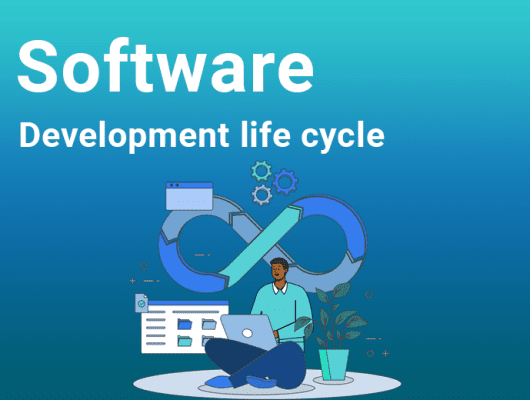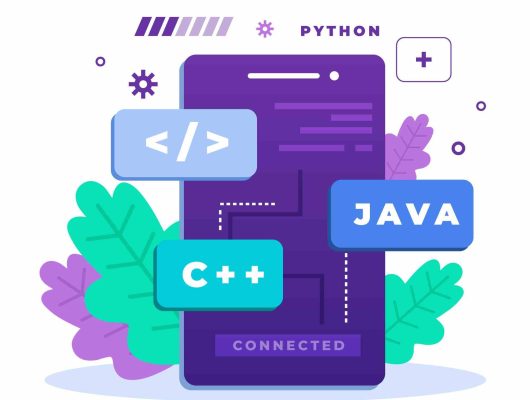
Healthcare app development guide
Developing a healthcare app involves creating software that assists patients, doctors, and healthcare providers in managing medical conditions, accessing information, and improving overall healthcare services.
This process includes understanding user needs, adhering to regulatory requirements, and integrating features like appointment scheduling, telemedicine, and electronic health records.
But what are the key features that make a healthcare app successful? How do developers navigate the complex landscape of healthcare regulations? What strategies can enhance user engagement and trust in healthcare applications? These questions are crucial for anyone looking to develop healthcare apps.
So, let’s find the answer to these queries using this guide.
Table of Contents
Understanding Healthcare app

Healthcare app development involves creating an app for mobile devices that enables users to track and monitor their health conditions in real-time. With just a few taps on their smartphones, users of mobile healthcare apps can also access a range of medical resources and healthcare facilities.
For example, developing mobile health applications is highly recommended for EHR (Electronic Health Records), hospital services, medical service experience, digitized medical insurance claims, etc.
Most importantly, these applications help to streamline hundreds of administrative and healthcare management duties, such as
- Tracking health conditions
- Accessing healthcare information
- Maintaining health records and more.
For users it enables the
- Tracking of well-being
- Seeking medical advice
- Receiving medical services delivered to their homes
- Measuring heart health etc.
Types of Healthcare apps Development and there Cost
Every firm has a different set of applications to choose from, and with that comes different cost considerations. Therefore, a basic knowledge of the price ranges and the variables affecting them is essential.
Apps For Health Care Service Provider
Below are a few categories of healthcare apps that doctors typically use, along with an average price range, to give you an idea.
EHRs or database apps
Costs associated with creating an EHR system or database app for doctors can vary depending on several criteria, including system needs, compliance standards, database complexity, and system integration. The average cost to develop a database application might be between $30,000 and $50,000.
App for Medical Networking
The cost of developing a medical networking app for doctors varies depending on the functionalities (such as secure messaging and referral management), system integration, and UI design. A medical networking app might start at between $30,000 and $60,000.
Invoicing App
When creating a billing app for doctors, it’s essential to consider things like insurance system connection, compliance standards, and the intricacy of billing procedures. Developing a fundamental billing app usually costs between $40,000 and $90,000.
Prescription App
Developing an ePrescription app for doctors can cost differently depending on features like drug history and electronic prescribing. Furthermore, it can rely on additional prerequisites such as regulatory compliance and pharmacy integration. For ePrescription, app development expenses typically fall between $40,000 and $80,000.
App for Scheduling Appointments
The cost of creating an app for doctors to schedule appointments is determined by patient alerts, calendar integration, EHR connection, and UI design. Developing an appointment booking software typically costs between $20,000 and $100,000.
App for Patient Education
Developing an app for physician-patient education might have varying costs depending on the complexity of the material, user engagement elements, multimedia integration (animations, movies), and integration with other healthcare systems. The initial outlay for developing an app for patient education typically ranges from $30,000 to $150,000.
Health Care App for Patients
The main app categories that patients utilize, together with an estimate of their prices, are mentioned here. Look it over.
Development of Fitness App
Factors such as healthcare technology, app functionality, design, and post-launch support affect the fundamental cost of producing a fitness app. Developing a fitness app often costs $10,000 to $50,000 or more.
Development of Dieting Apps
Personalized meal planning, thorough nutrition database integration, sophisticated diet algorithms, and user interaction features are just a few factors that can affect the cost of designing a dieting app. The price range for developing a dieting app is between $30,000 and $131,000.
Development of Wellness App
Features like fitness monitoring, mental health resources, meditation tools, and wearable device compatibility affects the cost of developing a wellness app. The starting price is often between $30,000 and $100,000.
Development of Telemedicine Apps
The intricacy of the video consultation features, the app’s integration with electronic health records, the ability to schedule appointments, and compliance with healthcare regulations are some factors that can affect the cost of developing a telemedicine app. The introductory price of creating a telemedicine app is between $40,000 and $75,000.
Development of Mental Health Apps
Developing an app for mental health can be expensive, depending on elements such as the intricacy of treatment algorithms, EHR connection, interactive coping mechanisms, and user-friendly interface design. Therefore, the development cost of a mental health app typically has a base cost of $50,000 to $1,000,000.
Development of Apps for Chronic Illness Management
Several factors influence a chronic illness management app’s development costs, including the range of conditions it covers, how well it integrates with different medical equipment to collect data, how well it implements data security measures, and how well it designs the user experience. The initial outlay for creating applications for managing chronic illnesses often ranges from $30,000 to $1,000,000.
How to build a Healthcare app

When developing an app for healthcare, several essential procedures must be taken to guarantee that the product meets all the requirements and works as intended before people can use it.
The following steps presents an extensive guide on how to create a healthcare application:
Understand your app idea and goal
Understanding the demands of your end customers is crucial to creating any medical or healthcare application. Therefore, analyze the issues people are having and how your software can help.
At this point, consider the app type as well. Your application can, for instance, focus on diabetes or anxiety monitoring etc.
Market analysis
Despite its apparent benefits, a healthcare app that lacks value will be a time-waster. So, market research is an essential step in the creation of mobile applications for healthcare.
Therefore, researching your area and learning more about your rivals, their advantages and disadvantages, and how you may differentiate yourself is crucial.
Employ a Company That Develops Healthcare Apps
Hiring a trustworthy healthcare mobile application development company guarantees your app will be created with all the cutting-edge features and technology needed to succeed in the healthcare industry.
An established healthcare app development business employs talented developers, testers, project managers, UI/UX designers, and market experts who work nonstop to realize your app concept.
Select the Appropriate Platform
Once your app’s purpose has been established, it’s time to decide whether to launch it on the web, iOS, or Android platforms.
To ensure your application is accessible with just a voice command, consider integrating it with a home assistant device.
It’s important to remember that younger patients are more likely to utilize apps and speech devices, while older patients typically prefer to visit websites.
Consider UI/UX Design
When developing mobile healthcare applications, UI/UX design is essential to the outcome of your work. Note that, older target audiences typically prefer more straightforward navigation and larger font sizes, whereas younger audiences want brighter user interfaces with more features.
In addition to its aesthetic design, it’s critical to consider how the app will appear on various screen sizes. Appropriately allocating time, funds, and resources is crucial to get it right.
Create an MVP
An MVP can be a crucial component of success instead of developing a complete program. Designing an MVP is the best way to ensure the solution is thoroughly tested and verified before it hits the market.
Investors may become interested in your app if you show them your MVP and future strategy so they can understand the market need for your app.
App Testing
One of the most critical phases in developing healthcare solutions is testing. Everything should be tested and improved, including the content and user interface. Appropriate testing will find flaws, reduce the time and expense of developing healthcare apps, and boost your company’s standing as a service provider.
When testing your healthcare app thoroughly, take note of the following:
- Protection of PHI, PII, and various additional laws.
- The app’s functionality, particularly regarding healthcare workflows.
- Verify the security of the Application Program Interface (API) you use to allow geolocation if your app needs it to work correctly.
- If the application deciphers information from several sources, including networks, devices, and locations.
- Test in unfavorable connectivity circumstances.
- Test your app’s usability thoroughly, and so forth.
Select Technology Stack
Based on the app’s requirements, choose a technology stack that considers security, scalability, and compatibility with HL7 and FHIR standards for healthcare.
Develop Frontend and Backend
Develop the backend using frameworks like Django, Spring Boot, or Node.js, paying close attention to data security and compliance. Additionally , use frameworks such as Vue.js, React, and React Native/Flutter to create a beautiful and user-friendly front end.
Integrate APIs
Use APIs for data analytics, telemedicine, electronic health records, and payment processing while creating a healthcare platform.
Put Security Measures in First Place
Secure information using strong security measures, such as secure login, powerful data encryption, and regular security checks. This helps you comply with rules and laws in the healthcare industry.
Choose a Strategy for Monetization
The healthcare industry has two business models for making money from apps: subscription-based and freemium, which require payment for access to premium features.
Moreover, in-app ads, third-party partnerships, and other monetization strategies are available to healthcare providers for making money using medical apps.
Deployment and Monitoring
Upload the software to the Google Play Store or Apple App Store, then utilize the tools provided by the monitoring services to assess feedback, performance, and security concerns.
Constant Improvement
Get input from users to determine what functions well and poorly. Additionally, based on user feedback, the app can be enhanced with the newest features, increased security, and a better user experience.
Feature to use for your HealthCare Minimal Variable Product
Here are the main characteristics and considerations for establishing an MVP during healthcare app development
Protecting Authentication and Access
Use secure authentication methods, like OpenID Connect or OAuth 2.0, to ensure that only authorized users can access the app. Utilize the TLS standard to create robust data encryption to protect the data transfer between the application and the server.
User Profile Management
Consider allowing users to set up and maintain their accounts, enabling them to enter their preferences, personal data, and medical history. Implement the necessary security measures to give users a means to update their profiles securely and without difficulty.
Advanced Search and Filter Option
This option allows consumers to search for healthcare providers, services, and facilities by area, specialty, availability, time, and ratings. The filters can narrow search results further for a more personalized experience.
Ratings and Reviews
Patients can rank and comment on healthcare professionals and services. Draw attention to these ratings and reviews on the home page to assist visitors in determining if the selected doctor is a suitable fit for them.
Appointment Scheduling
Include a feature that enables customers to schedule meetings with medical professionals. Your website provides users and suppliers with real-time availability information and confirmation messages.
Telemedicine Channel
Users and service providers can communicate through virtual consultations using built-in voice and video call features. Adherence to privacy laws, such as HIPAA, guarantees the security of communication routes.
Secure Online Chat
Incorporate an encrypted chat system to assist users in contacting medical personnel. Promote encryption in chat communications and give people a convenient way to view their chat history.
Payment Options
Provide safe gateways so patients can pay for different medical services. Additionally, it offers multiple payment methods, such as insurance billing, digital wallets, and credit/debit cards.
Notifications and Reminders
Provide alerts and reminders to assist users in remembering appointments, taking their medications on schedule, or even reading health advice. Users can also personalize their notification settings with it.
EHR Integration
Electronic health records (EHRs) should be integrated to enable users and healthcare providers to securely access and amend medical records. You must guarantee the observance of data privacy standards.
Accurate HIPAA Information
Undoubtedly, all PHI data needs to be kept private. You should also make sure that your health app complies with HIPAA regulations. To protect everyone’s data, it is essential to use secure connections, offer two-factor authentication, encrypt data, and adhere to numerous additional protocols.
Models of Healthcare Application Monetization
The product itself determines how profitable your customized healthcare solution may be. Will it be an IoT companion app connected to a smart device, a hospital app for patients, or medical mobile software for providers? Below are a few ways that these variations can be profitable.
- App Subscription
- One-time app purchases
- Endorsement
- Entitlement
- Per download payment .
Benefits of Healthcare apps
One of the main reasons healthcare app development solutions have become so popular with businesses is that they help medical professionals and the general public advance the healthcare industry.
Developing a healthcare application can yield countless advantages, including streamlining administrative procedures and enhancing the financial health of healthcare facilities. Let’s discover how.
Advantages for Health Care Workers
Although creating a healthcare app can be costly and time-consuming, it offers significant benefits to stakeholders and investors in the following areas:
Integrated Diagnostic Programs
These technologies enable the gathering and processing of data from the Internet of Things and embedded devices connected to EHR platforms.
Doctors working remotely can quickly assess and diagnose patients’ conditions, monitor their progress, and decide on the best course of action.
Correct Diagnosis
Medical applications help medical personnel diagnose patients accurately and early. Accurate and integrated diagnostic systems make better treatment plans, prompt healthcare delivery, and successful outcomes possible.
For example, VisualDx is one of the best healthcare and diagnostic support systems apps offering individualized advice.
Health Information Technology (EHR)
By integrating EHR systems, healthcare apps can effortlessly track, store, and gather all patient data securely on a single platform. Time is saved, mistakes are removed, and patient data can be shared with other healthcare facilities.
Uber, for instance, uses an EHR system to facilitate the transportation of medical patients. This company launched Uber Health, an on-demand ride-sharing service that enables doctors to schedule and monitor trips for their patients.
Telemedicine and telehealth
SaMD (Software as a medical device) and other telemedicine and telehealth software solutions are in high demand, especially during the COVID-19 pandemic and social isolation. It enables healthcare providers to communicate online, provide top-notch care more quickly, and provide distant healthcare services.
Electronic Prescription
With e-prescribing apps, physicians may precisely prescribe drugs to patients, modify dosages to prevent any adverse effects, and cancel prescriptions if necessary.
These platforms are essential for reducing pharmaceutical errors and maximizing doctor and patient time. One such app is Medscape, which enables physicians to upload prescriptions within the app according to the patient’s needs.
Enhanced Interaction
Doctors can engage in meaningful remote consultations and talks with patients through various telehealth tools.
Reduced Anxiety and Exhaustion
Healthcare mobile app development improves the dependability of medical systems and procedures, freeing experts from tedious work.
Improved Equipment and Service Administration
Through the development of healthcare software, users can maximize the use of medical equipment by monitoring it in real-time. For example, a proprietary medical app monitors every ventilator on the property.
Advantages of Developing Health Apps for Patients
There are several use cases for healthcare apps that are advantageous to patients and medical professionals. These applications make better use of mobile phones’ accessibility and ease to improve patient care overall and the provision of medical services. Here are a few noteworthy advantages that patients can enjoy from hospital mobile apps:
Superior Medical Care
Patients can use IoT-connected wearable devices or smartphone sensors to track their overall health, chronic ailments, sleep patterns, heart rate, and disease symptoms using enhanced healthcare apps for fitness, nutrition, and other areas.
Continuous Monitoring makes it possible to identify health problems early and take appropriate action, improving overall patient care.
Accessible Healthcare Data
For improved patient monitoring, medical data and healthcare information are readily accessible through a mobile app platform.
Patients can now exchange their health information and symptom reports with their healthcare providers and receive news and information about healthcare from home or while on the go. For example, UpToDate is a mobile app for healthcare that monitors workflow, health kits, medical news, and user accomplishments daily.
On-Demand Obtainable Healthcare
Every regular user now has easy access to on-demand medical services thanks to mobile app development for healthcare. It indicates that patients receive medical care—drug delivery, sample collection, prescriptions, etc.—at their door faster.
Enhanced method of therapy
mHealth apps can schedule video conferences between patients and physicians to facilitate more comfortable communication. Physicians possess all the instruments required to examine patients effectively. They can also manage the medication schedule via the app and create prescription lists.
Online money transfer
The healthcare app does not require cash. Patients only need the app to book and pay for an appointment. It is quick, easy, and available.
Best Practices for Healthcare App Development
Following are the few practices you should consider while developing you app
Observing every compliance rule
The healthcare sector is notoriously stringent when it comes to following regulatory and security procedures. When creating a mhealth app, you must follow some legal requirements. HIPAA, HIMSS, FDC, and other compliances are among the most prevalent. Make sure your healthcare app conforms with these before designing it.
- HIPAA requires US healthcare organizations to follow rules to protect patients’ private health information and ensure its security and privacy.
- The Customer Confidentiality Protection Act (CCPA) governs confidentiality in the United States, which is essential. It includes informing the customer about the collected data and managing the client data report.
- NIST is another set of industry standards, instruments, and technology developed to safeguard user information from US medical applications.
- HiTech standards focus on securing data in healthcare and medical apps, especially Electronic Health Record (EHR) systems.
- PIPEDA: If your mHealth app was created for the Canadian market, it must adhere to PIPEDA.
Single-Major Objective
Businesses should concentrate on developing a single type of app, such as fitness tracking or appointment scheduling. It is better to specialize in one area than cover all healthcare categories.
By focusing on a specific niche, businesses can better meet the needs of their target audience. This approach can lead to a more prosperous and effective app development strategy.
Businesses specializing in one area can offer stakeholders more value and solve problems more effectively. They can focus all their resources and expertise on that area.
By concentrating on a single expertise, businesses can better understand and address the specific needs of their customers. This approach allows them to deliver higher quality products or services tailored to meet those needs.
Cooperation
The fundamental function of healthcare mobile apps is information transfer between devices. Developing hospital apps should prioritize clear, instant, and safe communication between systems.
Choosing a Feature Set
The characteristics of a healthcare mobile app are crucial to a health solution’s success. Most applications have standard components, even though their functionalities may differ. These components consist of but are not restricted to:
- Keeping an eye on health
- Making an appointment
- In-app purchases
- Combining wearables with
- Functionality for reporting
- Integration of social media (if a fitness app)
Hack-Proof Online safety
Health apps must be secure from hackers by following cybersecurity protocols to prevent data breaches and theft.
When you build a healthcare app, follow security laws like HIPAA or HIMSS. This will protect your app from cybercriminals and keep it safe. You may also include a biometric screen lock to improve app security and prevent data breaches.
Selection of Hardware
The app you intend to release does not need to work on a smartphone. The software may also have a PC and wearable version.
It’s important to know that you can use your application on different types of hardware.
Similarly, there may be situations in which enabling two or more devices to communicate with one another is necessary. In this case, you want to select hardware components that are compatible with one another.
Selection of Integrations and APIs
Choosing the proper API to keep your processes safe from hacking can be difficult with so many options available. Selecting the correct API and integration is essential for your healthcare app. This ensures that it functions properly and provides the desired service. Making the right choice will guarantee that your app meets your expectations.
Future trends in Healthcare app development
Healthcare apps are becoming more critical. They make it easier to access services and benefit from technological advancements. These six significant themes will influence how healthcare application development develops in the future.
- IOMT
- Cybersecurity
- Blockchain
- Telemedicine
- Cloud Computing
- Machine learning and Artificial Intelligence
Conclusion
We cannot downplay the significance of healthcare app development in the ever-changing healthcare industry. It has become a revolutionary way to improve patient care, manage data, and make operations more efficient. Additionally, it helps outperform rivals and transform the healthcare industry. So, Working with Onyxtec to create healthcare mobile apps can be a wise decision.
We provide top healthcare app solutions to enhance healthcare, including clinical management, patient treatment, and diagnosis.
Among the services we offer are
- Development of telehealth applications
- EHRs, prescription drugs, and health insurance apps
- Management of laboratories
- Process control Monitoring of lifestyle
- Integration of software, among other things
Look at all our work to see how well we make new mobile apps for different industries, like healthcare. Then, with confidence, make us your choice.
Speak with us today to begin digitizing your healthcare company.
FAQ
How Much Does Developing a Healthcare App Cost?
Developing a healthcare app for iOS and Android with a complete backend structure and design usually costs around $150,000. This includes services for development team communication, quality assurance, and product management.
How Can a Medical Mobile App Be Made Effective?
Any app’s effectiveness is built on teamwork and a product mindset. The development, design, and product teams collaborate closely to produce apps that function well and satisfy user needs. Not to mention the product attitude. Making informed business decisions and keeping the client in mind is beneficial.




